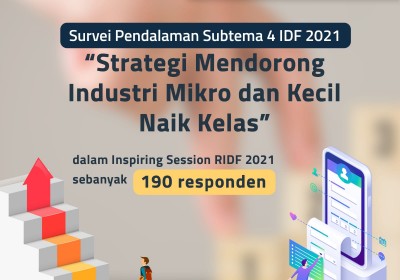The Factors that Can Help Small Industries Upscale
August 26, 2021
JAKARTA – To help recover the national economy following the Covid-19 pandemic's effects, one of the methods that Indonesia has tried to focus on is pushing and encouraging economic activity from small to medium-scale industries (IKM).
IKMs make up 90% of all Indonesia's industries, therefore, guiding and assisting them is crucial in boosting their productivity, output and business scale.
This is the theme of a recent online survey held by the Ministry of National Development Planning/Bappenas through the Indonesia Development Forum (IDF) event, of which 190 respondents took part during the Inspiring Session Road to IDF webinar on Tuesday (29/6). The survey participants mainly consisted of those in the 25-50 age bracket across all provinces, and are typically employed as government workers, public sector workers, academics, university students, entrepreneurs and housewives. The topic of the survey is in line with one of 5 IDF subthemes, namely Subtheme 4: Strategies in Upgrading Micro and Small Scale Industries and consist of 5 in depth questions.
The results of this survey concluded that in order to properly encourage IKM growth, they would need effective access to funding, digitalization, innovation guidance and also consider the eco-friendliness of their products.
The issue of funding access (and management) remains one of the main obstacles hindering IKM growth in Indonesia. To alleviate this, the government has already implemented such efforts such as government-sponsored credit programs. The results of the Inspiring Session Road to IDF 2021 survey confirmed that a majority (87.9%) assessed that government credit programs such as the various supermicro loan programs (KUR) are the best way for IKMs to obtain funding for their businesses.
Up to 41.1% also considered that increasing the understanding and utilization of digital methods, including to access capital and markets, is an incredibly important step for IKMs to manage their production, distribution and marketing methods as well.
Many IKMs in Indonesia have been unable to develop their businesses further due to limited innovation, thereby limiting their opportunities in the market. This is the main concern of up to 48.4% of respondents, who feel that boosting cooperation with relevant parties on innovation and technologies which are able to support the improvement of product quality and business competitiveness and ensure the IKM's rise from the pandemic's economic impacts. Only 7.4% thought that a government stimulus package which merely gives direct funding to IKMs is a solution to recover from the pandemic.
IKMs need to adopt more innovative practices and absorb the knowhow so that they are able to adapt their products and services to the dynamics of community demand, including to produce environmentally friendly products and services. The ability of IKMs to respond to green product trends need to also be enhances, and according to around half of the survey's respondents, support is needed in procuring appropriate technology and in developing human resource skills.
Appropriate technologies and skilled human resource management can also help increase the likelihood of Indonesian IKMs to implement more environmentally friendly production processes and, in the end, produce high value-added products that are sustainable going forward.
Meanwhile, around 42.6% of respondents think that production capacity and innovation are the most important factors to consider for IKMs to be able to upgrade. Support for these IKMs to upgrade requires the collaboration and cooperation of various parties, namely between government institutions, educational institutions, commerce chambers, community associations and IKMs themselves.
More productive IKMs would help create new sources of income, new jobs and in the long run, help reduce Indonesia's poverty rate.
Indonesia’s Research Institutions Supporting the Development of the Electric Vehicle Industry
Indonesian Muslim Fashion and Cosmetics IKMs Shine at Dubai World Expo 2020
Govt Steps Up UMKM Transformation Efforts in the Midst of Pandemic Slowdown
Govt Encourages Promotion of IKM Products in Digital Era
Government Begins Developing Maritime Training Center in Makassar
Tweets by IDDevForum
